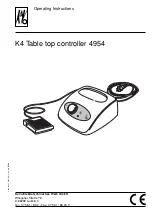
MAINTENANCE AND SERVICING
Form 169017 / 169087 / 169095
206
Revision C
7.13.2.3 Wheel Nut Torque
At first use, or when a wheel is removed, check
caster wheel bolt torque as follows after 5 hours,
and then at 200 hour intervals:
NOTE
To avoid damage to wheel rims, do not
over-tighten wheel nuts.
Forked Casters
a. Tighten nuts (A) to 120 ft·lbf (163 N·m), using the
tightening sequence as shown.
b. Repeat sequence three times.
Formed Casters
a. Tighten nuts (B) to 120 ft·lbf (163 N·m), using the
tightening sequence as shown.
b. Repeat sequence three times.
7.13.2.4 Forked Caster Wheel Removal /
Installation
DANGER
To avoid severe personal injury or death
caused by machine runaway, shut off engine
and remove key before performing any of the
following checks and/or adjustments.
a. Remove the caster wheel as follows:
1. Park windrower on level ground, and block all
wheels.
2. Place GSL in N-DETENT, Shutdown engine,
and remove key.
3. Raise end of walking beam, using a jack
[4000 lb (1816 kg)] capacity (or other suitable
lifting device), until the wheel is slightly off the
ground.
4. Remove the eight bolts (C) attaching axle to
forked caster, and remove wheel assembly
from caster.
5. Undo the eight wheel nuts (D) and remove
wheel from axle.
b. Install the caster wheel as follows:
1. Position wheel on axle, and install wheel nuts
(D).
2. Torque nuts (D) as specified in previous
section. Refer to Section 7.13.2.3, Wheel Nut
Torque.
3. Position wheel assembly in forked caster and
install with bolts (C). Torque bolts to 75 - 79
ft·lbf (97 - 107 N·m).
4. Lower windrower, and remove jack.
A
1
5
3
7
8
2
4
6
D
C
1
5
3
2
4
6
B
















































